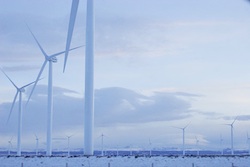The wind industry has gained some momentum as the year comes to a close. Last Friday, President Obama signed into law the tax bill that includes a one-year extension of the 1603 investment tax credit for developing renewable energy sources including wind. Denise Bode, the CEO of the American Wind Energy Association said of the event, “This is a great holiday present for the 85,000 American workers in the wind energy industry, tens of thousands of whom will now be able to get back to work in a sector that has been a bright spot in the recession so far.”
Bode believes that this governmental action will be a signal to investors to put more capital back into the U.S. economy. She anticipates that new orders will be on the rise and with wind power reaching 20 percent of the total in Iowa and at times contributing to 25 percent of total power needs in Texas, Bode sees a “a whole lot more” affordable wind energy to come. “The inclusion of renewable energy in the tax bill is a clear indication of strong bipartisan support for the wind industry, which will make more renewable energy than any other technology for decades,” she said.
 Another big win for the industry last week was word that the Federal Energy Regulatory Commission (FERC) approved a proposal by Midwest Independent System Operator (MISO), the company that operates the grid throughout the Midwest, to create a new cost allocation policy, or “regime” to pay for transmission upgrades. These upgrades are needed to develop transmission infrastructure, improve reliability, reduce electric bills, foster economic development, and provide consumers access to wind energy and other forms of renewable energy.
Another big win for the industry last week was word that the Federal Energy Regulatory Commission (FERC) approved a proposal by Midwest Independent System Operator (MISO), the company that operates the grid throughout the Midwest, to create a new cost allocation policy, or “regime” to pay for transmission upgrades. These upgrades are needed to develop transmission infrastructure, improve reliability, reduce electric bills, foster economic development, and provide consumers access to wind energy and other forms of renewable energy.
The regime creates a new category of transmission projects called Multi-Value Projects (MVPs). The MVP concept is based on the recognition of the numerous, widely shared benefits provided by enhanced transmission infrastructure and, accordingly, spreads the costs for these lines across the MISO footprint.
“We applaud the Commission’s decision to approve the MISO proposal with respect to Multi-Value Projects, as it represents a significant improvement over the existing cost allocation proposal,” said AWEA’s Senior Vice-President for Public Policy Rob Gramlich. “With this policy in place, the Midwest is ready to step up to the plate and support wind development and unlock the associated manufacturing and supply chain jobs throughout the region. The proposed mechanism would spread the costs of new transmission infrastructure to the beneficiaries, allowing the region to build a robust transmission grid that will bring reliability and economic benefits as well as supporting state, regional and national policy goals. This policy is a tremendous victory for the region’s consumers, environment, and economy.”

